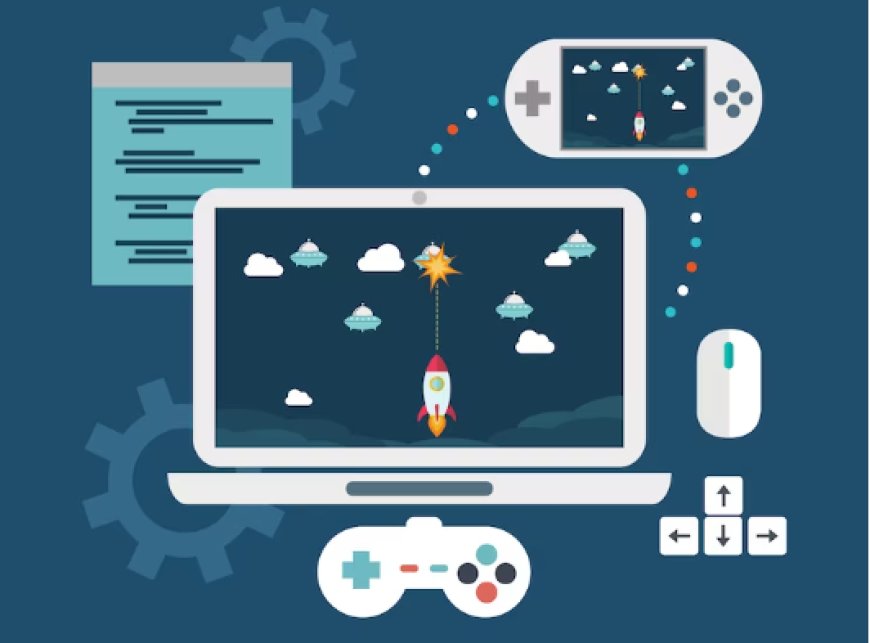Introduction to Creating Games with Python
Learn game development, Python, coding, basics, graphics, logic, projects, tools, tutorials, programming, design, and software.

Python is an incredibly versatile language for game development. It's known for being easy to use, having a wide range of libraries, and having a supportive community. Whether you're a beginner or an experienced developer, Python's simplicity and readability make it a great choice. Plus, with frameworks like Pygame, Panda3D, and Godot Engine, you can create all kinds of games, from simple 2D platformers to immersive 3D simulations.
For text-based games, Python's string manipulation and logical control flow facilitate the development of engaging narratives and decision-based gameplay. Moreover, its capacity for handling data and processing algorithms empowers the creation of complex game mechanics and artificial intelligence systems.
In the realm of graphical games, Python's graphical libraries, such as Pygame and Arcade, provide a robust foundation for building visually appealing interfaces and dynamic animations. Additionally, its compatibility with popular game engines like Unity and Unreal Engine via scripting bridges expands its capabilities for developing high-quality, multi-platform games.
Python's active community, abundant online resources, and comprehensive documentation further facilitate learning and problem-solving, making it an indispensable tool for anyone interested in game development. Its versatility in handling various game genres continues to attract a diverse range of developers, cementing its significance in the gaming industry.
Strategies for Success:
Aspiring game developers, whether they are indie creators or programming enthusiasts, encounter several hurdles in the realm of Python game development. To successfully navigate these challenges, a deep comprehension of fundamental game design principles is paramount. Moreover, mastery of Python libraries like Pygame, with its capabilities for handling multimedia and user input, is essential in creating engaging gaming experiences. Additionally, optimising code for performance, considering factors such as memory management and rendering efficiency, is crucial for delivering seamless gameplay. Embracing a diverse range of game types, including text-based adventures, puzzle games, and 2D graphical games, allows developers to explore different avenues for creativity and innovation, contributing to a dynamic and thriving game development landscape.
Aspiring game developers must grasp fundamental game design principles, wield Python libraries like Pygame, and optimise code for seamless performance in their Python game development endeavours.
Achieving Mastery in Developing Games using Python:
Let's delve deeper into these key components:
1. Python Programming Proficiency
-
A strong foundation in Python programming is the cornerstone of game development. Understanding the language's syntax, data structures, and object-oriented programming concepts is vital.
-
Familiarity with Python's built-in functions and libraries allows you to efficiently write code for game mechanics, user interfaces, and more.
-
Practice and continuous learning are crucial to mastering Python, as they help you write clean and efficient code.
2. Game Design Concepts
-
Game design involves creating the rules, mechanics, and overall user experience of a game. Understanding game design principles is essential for crafting enjoyable and immersive games.
-
Study concepts like player motivation, game balance, and user feedback to design games that captivate and retain players.
-
Learning to storyboard and create game design documents can help you plan and execute your game development projects effectively.
3. Relevant Libraries
-
Python offers powerful libraries for game development, with Pygame and Pyglet being popular choices. These libraries provide tools for handling graphics, audio, input, and more.
-
Mastering these libraries allows you to create 2D games, animations, and interactive user interfaces with ease.
-
Stay updated with library developments and best practices to leverage their full potential.
4. Logical Reasoning
-
Game development requires strong logical reasoning skills. You must break down complex problems into smaller, manageable components and devise logical solutions.
-
Logical thinking helps in creating game algorithms, handling collisions, and implementing game rules effectively.
5. Problem-Solving Abilities
-
Game development often involves overcoming technical challenges and bugs. Problem-solving skills are essential for identifying and resolving issues efficiently.
-
Debugging code, optimising performance, and troubleshooting are common tasks in game development.
6. Creativity
-
Creativity is at the heart of game development. It fuels the generation of innovative game ideas, unique gameplay mechanics, and captivating storylines.
-
A creative mindset enables you to design visually appealing graphics, engaging characters, and immersive worlds.
7. Continuous Learning and Practice
-
Game development is a dynamic field. Stay updated with emerging technologies and trends in the gaming industry to remain competitive.
-
Regular practice, working on personal projects, and collaborating with the game development community are vital for skill improvement.
Becoming proficient in creating games with Python involves a multifaceted approach. Mastering Python programming, understanding game design, utilising libraries, and honing logical, problem-solving, and creative skills will empower you to build games that captivate and entertain players.
To start your exciting adventure of creating games with Python, simply follow these 4 essential steps:
Master Python Fundamentals:
-
Familiarise yourself with Python's syntax, data types, and control structures.
-
Learn about functions, modules, and object-oriented programming concepts.
Grasp Game Development Basics:
-
Understand game design principles such as game mechanics, player engagement, and storytelling.
-
Learn about game loops, collision detection, and user input handling for interactive gameplay.
Explore Python Libraries for Game Development:
-
Dive into Pygame, a popular Python library for building graphical games.
-
Learn about rendering graphics, handling sound, and creating interactive user interfaces using Pygame.
Practice with Simple Projects:
-
Start with simple game projects like text-based adventures or basic puzzle games.
-
Implement learned concepts and gradually incorporate more advanced features as you progress.
Accessing online resources, tutorials, and vibrant Python game development communities is essential for gaining practical knowledge and valuable insights.
These platforms offer a wealth of information, from beginner-friendly guides to advanced techniques, empowering you to delve into the world of game development. Additionally, regular practice and experimentation with diverse game concepts are key to honing your coding skills. By tackling various projects and continuously refining your game development abilities, you'll enhance your coding proficiency and creativity. This hands-on approach allows you to apply what you've learned, troubleshoot challenges, and create engaging games, fostering growth as a game developer.
To succeed in game development, having a strong programming foundation, a creative mindset, and a genuine passion for gaming are essential. These fundamentals are timeless and will always be the building blocks of successful game development. Even as technology and trends change, the core principles of logic, problem-solving, and creativity endure. Developers who possess these qualifications can easily adapt to evolving technologies and contribute to creating engaging and innovative gaming experiences.
Creating games with Python is a thrilling adventure that demands commitment, ongoing learning, and a true love for programming and gaming. By mastering Python and game development techniques, developers can transform their creative ideas into captivating and immersive gaming experiences. This contributes to the vibrant and constantly evolving gaming industry.





































